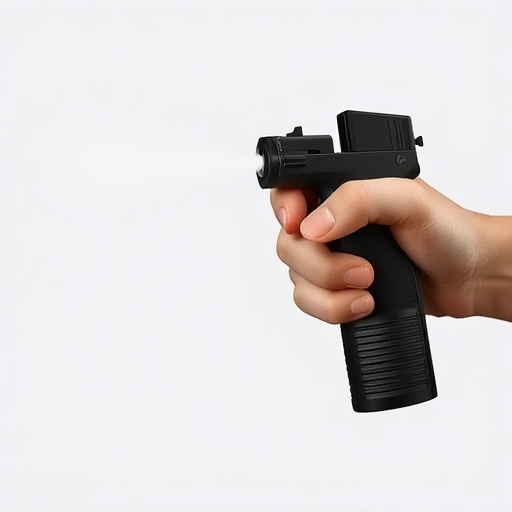In hot climates, effective hot climate pepper spray storage is crucial for maintaining potency and reliability. Temperatures and humidity can degrade active ingredients, so keeping sprays in cool, dry, shaded areas away from direct sunlight and heat sources is essential. Manufacturers often recommend temperature-controlled environments to preserve potency, and safe handling practices include wearing gloves and ensuring good ventilation during use. Local laws and regulations vary globally, with hot climate regions having unique challenges that require careful storage conditions to maintain effectiveness and safety.
Personal protection devices, especially pepper spray, have become essential tools for self-defense. Understanding chemical irritants at the core of these devices is crucial. This article explores their role in personal safety, focusing on hot climate considerations and the importance of choosing the right pepper spray. We delve into storage and safety practices to ensure effectiveness, while also navigating regulatory aspects surrounding ownership. Key topics include optimal storage methods for hot climates and legal implications, providing a comprehensive guide to responsible pepper spray use.
- Understanding Chemical Irritants: Their Role in Personal Protection
- Hot Climate Considerations: Choosing the Right Pepper Spray
- Storage and Safety: Ensuring Effectiveness and Minimizing Risk
- Regulatory and Legal Aspects of Pepper Spray Ownership
Understanding Chemical Irritants: Their Role in Personal Protection
In the realm of personal protection, chemical irritants play a pivotal role, especially in devices designed for use in hot climates. These substances are meticulously chosen to create an effective barrier against potential threats, ensuring safety and security. Hot climate pepper spray, for instance, utilizes capsaicin, the active ingredient found in hot peppers, as its primary irritant. When deployed, it temporarily disrupts visual and respiratory functions of attackers, providing users with crucial time to escape or defend themselves.
Proper storage is essential for maintaining the potency and effectiveness of these chemical irritants. In hot environments, specific considerations come into play. For instance, pepper spray should be stored in cool, dry places, away from direct sunlight and heat sources. Appropriate storage conditions safeguard the integrity of the active ingredients, ensuring their ability to cause irritation when needed most, especially in challenging weather conditions.
Hot Climate Considerations: Choosing the Right Pepper Spray
In hot climates, the effectiveness and usability of pepper spray can be influenced by temperature and humidity levels. It’s crucial to select a pepper spray designed for such conditions, as extreme heat can reduce the spray’s potency and range. Look for products labeled as “hot climate” or “high-temperature formula” which are typically engineered with enhanced stability and performance in warmer environments.
Proper storage is another key factor. Hot climates require careful handling to maintain the integrity of the pepper spray. Store your chosen pepper spray in a cool, dry place, avoiding direct sunlight and extreme heat sources. Some manufacturers even recommend refrigeration for optimal preservation, ensuring you have a reliable self-defense tool when needed most.
Storage and Safety: Ensuring Effectiveness and Minimizing Risk
In hot climates, proper storage and safety measures are crucial for maintaining the effectiveness of personal protection devices like pepper spray. Extreme temperatures can degrade the active ingredients over time, so it’s essential to store them in cool, dry places away from direct sunlight. Many manufacturers recommend keeping pepper spray in temperature-controlled environments to ensure its potency remains intact. Additionally, keeping them out of reach of children and pets minimizes both accidental misuse and potential harm.
When handling pepper spray, safety protocols should always be followed to minimize risk. This includes wearing protective gloves and ensuring adequate ventilation during application. Regular maintenance, such as checking expiration dates and testing the spray mechanism, is also vital. By adhering to these simple yet critical practices, users can maximize the effectiveness of their personal protection devices while safeguarding against unwanted health risks.
Regulatory and Legal Aspects of Pepper Spray Ownership
In many regions, the possession and use of pepper spray for personal protection are governed by stringent legal and regulatory frameworks. These rules vary significantly across countries and even within states or provinces, so it’s crucial to understand local laws before acquiring such devices. The regulatory landscape is particularly complex when considering hot climate regions where storage conditions must be carefully managed to maintain the effectiveness and safety of pepper spray.
In some areas, strict regulations limit who can own and carry pepper spray, often requiring permits or specific training. Additionally, there are guidelines for proper storage, including temperature and humidity controls, to ensure the integrity of the product. Hot climates pose unique challenges as extreme heat can degrade the active ingredients in pepper spray, reducing its potency. Therefore, owners must store their devices in cool, dry places, adhering to both legal requirements and manufacturers’ recommendations to guarantee optimal performance when needed.
In conclusion, understanding chemical irritants like pepper spray is key to effective personal protection. When considering a pepper spray for hot climate conditions, factors such as temperature resistance and swift-acting formulas are vital. Proper storage methods and safety protocols ensure the product remains potent and reduces potential risks. Additionally, being aware of local regulations regarding pepper spray ownership is essential for responsible use and compliance. By integrating these insights into your personal protection regimen, you can maximize the benefits of hot climate pepper spray while adhering to legal boundaries.
